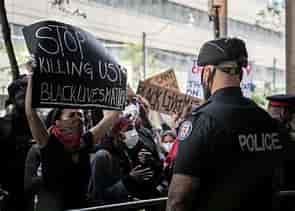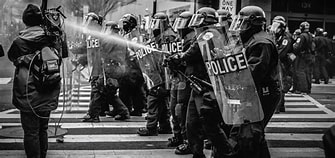The Shocking Truth About Police Brutality
Introduction
Imagine walking down the street, feeling safe and secure, only to be confronted by law enforcement in a way that makes you question your very existence. For many people of color in the United States, this scenario is an all-too-familiar reality. Police brutality is not just a headline; it’s a systemic issue deeply rooted in racism and impunity. This article delves into the shocking truth about police brutality, exploring its historical context, current implications, and the urgent need for reform.
Understanding Police Brutality
What is Police Brutality?
Police brutality refers to the excessive and unnecessary use of force by law enforcement officers. This can manifest in various forms, including physical violence, verbal abuse, and even wrongful deaths. The term often evokes images of high-profile cases that have sparked national outrage, but the reality is that these incidents are part of a larger, systemic problem.

The Statistics Speak Volumes
The numbers tell a grim story. Black Americans are three times more likely to be killed by police than their white counterparts. In fact, only about 1% of police killings result in charges against officers involved. These statistics are not just numbers; they represent lives lost, families shattered, and communities traumatized.
The Roots of Systemic Racism
A Historical Overview
To understand police brutality today, we must look back at history. The roots of systemic racism in policing can be traced to the days of slavery and the subsequent Jim Crow laws. After slavery was abolished, laws were enacted to control the newly freed Black population, criminalizing their freedom and mobility. This legacy continues to influence policing practices today.
The Role of Racial Profiling
Racial profiling is a direct offshoot of systemic racism. It involves law enforcement targeting individuals based on their race rather than any evidence of wrongdoing. This practice not only perpetuates stereotypes but also fosters an environment where violence against marginalized communities becomes normalized.
The Impact of Police Brutality on Communities
Psychological Effects
The trauma inflicted by police brutality extends beyond physical harm. Many victims experience long-lasting psychological effects such as PTSD, anxiety, and depression. The American Medical Association has recognized police violence as a public health crisis that disproportionately affects marginalized communities.
Community Trust Erosion
When police brutality occurs, it erodes trust between law enforcement and the communities they serve. This mistrust can lead to underreporting of crimes and reluctance to cooperate with police investigations, further exacerbating tensions.
Case Studies: High-Profile Incidents
George Floyd: A Catalyst for Change
The murder of George Floyd in 2020 ignited protests worldwide and brought renewed attention to police brutality. His death served as a wake-up call for many who were previously unaware of the systemic issues at play. The video footage of his death was a stark reminder that this is not just an isolated incident but part of a broader pattern.
Breonna Taylor: A Tragic Loss
Breonna Taylor’s case highlights another facet of police violence—no-knock warrants that lead to tragic outcomes. Taylor was shot in her own home during a botched raid, raising questions about accountability and the need for reform in policing practices.
The Role of Media in Shaping Perceptions
Media Coverage and Public Perception
Media plays a crucial role in shaping public perception regarding police brutality. Sensationalized coverage can sometimes overshadow the systemic issues at play, focusing instead on individual cases without addressing the broader context.
Social Media as a Tool for Change
In recent years, social media has emerged as a powerful tool for activism. Hashtags like #BlackLivesMatter have mobilized millions to demand justice and accountability from law enforcement agencies.
Calls for Reform: What Needs to Change?
Legislative Action
Comprehensive legislative reforms are essential to address systemic racism within policing. This includes banning chokeholds, implementing body cameras, and establishing independent oversight committees to investigate incidents of police violence.
Community-Based Approaches
Community-based safety practices can serve as alternatives to traditional policing methods. These approaches prioritize mental health resources and community engagement over punitive measures.

Impunity: The Lack of Accountability
Why Officers Often Go Unpunished
One of the most shocking aspects of police brutality is the culture of impunity that often shields officers from accountability. Many departments have policies that protect officers from being held responsible for their actions, perpetuating a cycle of violence.
The Need for Accountability Mechanisms
Establishing clear accountability mechanisms is crucial for restoring trust between law enforcement and communities. This could involve independent investigations into police misconduct and harsher penalties for officers who engage in excessive force.
The Global Perspective on Police Violence
International Comparisons
While police brutality is often viewed through an American lens, it’s important to recognize that this issue exists globally. Countries around the world grapple with similar challenges related to systemic racism within law enforcement agencies.
Lessons from Other Nations
Some countries have implemented successful reforms that could serve as models for change in the U.S. For example, Norway’s approach to policing emphasizes de-escalation techniques and community engagement over aggressive tactics.

The Future: Moving Toward Justice
Grassroots Movements Leading the Charge
Grassroots movements are at the forefront of advocating for change. Organizations like Black Lives Matter have mobilized communities across the nation to demand justice and reform in policing practices.
Engaging Allies in the Fight Against Racism
It’s essential for allies from all backgrounds to engage in conversations about race and policing. Understanding how systemic racism affects marginalized communities can help foster empathy and drive meaningful change.
Conclusion: A Call to Action
The shocking truth about police brutality reveals deep-seated issues within our society—issues rooted in systemic racism and impunity that demand urgent attention. As individuals and communities come together to advocate for change, we must remain vigilant in our efforts to dismantle these oppressive systems. Only then can we hope for a future where justice truly serves all members of society.
FAQs About Police Brutality and Systemic Racism
1. What constitutes police brutality?
Police brutality refers to excessive or unnecessary force used by law enforcement officers against civilians, often resulting in injury or death.
2. How does systemic racism manifest in policing?
Systemic racism manifests through practices such as racial profiling, discriminatory policies, and a lack of accountability for officers involved in violent incidents against marginalized communities.
3. What are some examples of high-profile cases related to police brutality?
Notable cases include George Floyd’s murder in 2020 and Breonna Taylor’s shooting during a botched raid—both highlighting critical issues within law enforcement practices.
4. Why is accountability important in addressing police violence?
Accountability is crucial because it helps restore trust between law enforcement agencies and communities while ensuring that officers who engage in misconduct face appropriate consequences.
5. How can individuals support efforts against police brutality?
Individuals can support these efforts by educating themselves on issues related to systemic racism, participating in protests or advocacy groups, and engaging in discussions about reform with their communities.


